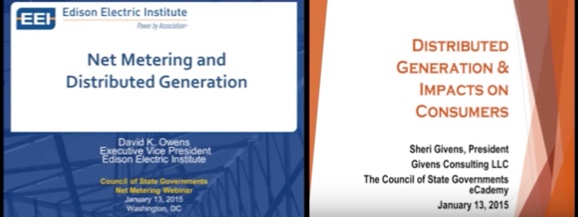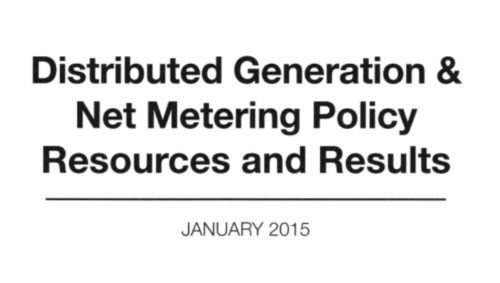In a three-month span starting in November 2014, a series of letters, reports and white papers all coalesced around a theme: customers were at risk of being ripped off by rapacious rooftop solar companies. Protecting customers, the letters suggested, would require greater investigation and regulation of the rooftop solar industry from government agencies.
Coordinated effort
Documents obtained by UtilitySecrets.org show that many of those materials were part of an effort coordinated by electric utilities and their trade association, the Edison Electric Institute (EEI), to tar and feather rooftop solar companies with a myth of wide-scale customer abuse. In the past two years, utilities have used the materials as the basis to push for new anti-solar laws in a variety of states, ranging from Florida to New Mexico. The effort is still ongoing more than two years later.
UtilitySecrets.org obtained an internal EEI briefing book from January 2015 called “Distributed Generation & Net Metering Policy Resources and Results,” which includes a “Consumer Protection” section that offers a greatest-hits list of highlights from the campaign, including:
- A December 12, 2014 letter written by members of Congress to the Federal Trade Commission (FTC) calling for an investigation of rooftop solar companies;
- A November 19, 2014 letter written by members of Congress to the Consumer Protection Financial Bureau (CPFB) asking if the agency has investigated rooftop solar companies;
- Resolutions from the National Association of State Utility Consumer Advocates and the National Black Caucus of State Legislators (NBCSL) decrying rooftop solar sales practices;
- “Consumers Guide” for rooftop solar installation authored by the Louisiana State University Agriculture Center.
Separate documents and emails obtained by the Energy and Policy Institute and other investigative reporters reveal how EEI and investor-owned utilities had their hands in each of those efforts, as well as others.
The internal EEI report also shows the trade association’s detailed tracking of efforts by utilities to undermine net metering policies and to increase fixed charges. Fixed charges are regressive electric rate structures which have the effect of making it more expensive for customers to go solar or to become more energy efficient, and which also land the hardest on poor customers.
[Editorial note: neither UtilitySecrets.org, nor either of the organizations behind it, receive funding from for-profit corporations.]
EEI pays for, manipulates, “Consumers Guide” to solar
One of the resources listed in the EEI briefing books is a section of a report from the Louisiana State University Agriculture Center, called “Solar Power for your Home: A Consumer’s Guide” that was published in February 2015. Public record requests to the state university revealed that EEI had paid $49, 701 to fund the report and manipulated its contents. Some aspects of the report seem designed to reinforce utilities’ fear-mongering about rooftop solar.
EEI’s significant editorial input is revealed in emails showing tracked changes by EEI’s VP of External Affairs Brian McCormack sent to the report’s author, Claudette Reichel.
Some of McCormack’s edits include:
- Deleting statements about solar’s attractive environmental attributes compared to fossil fuels.
- Deleting references to rising prices of electricity sold by utilities.
- Deleting references to rooftop solar panels obviating the need for new power plants.
- Adding references to heighten skepticism of rooftop solar companies.
- Inserting examples of utility solar programs as an alternative to rooftop solar.
The report includes sections like “Be Cautious About Predicted Savings” that encourage customers to “ask your utility company how rates have changed in the past few years and compare to the power purchase agreement’s escalation rate.”
EEI’s General Counsel, Ed Comer, explicitly asked Reichel not to list he or McCormack in the report’s acknowledgments to cover their tracks. They were ultimately listed, but Reichel seemed keenly aware of the need to hide EEI’s influence. In one email, she wrote: “We need to be careful that it does not read as having a utility bias, or it could be criticized and dismissed as skewed – defeating your purpose in having LSU author and publish it.”
EEI sent Reichel to the annual meeting of the National Association of State Utility Consumer Advocates in November 2014 to present her findings. NASUCA passed a resolution at that meeting cautioning against rooftop solar “fraudulent and deceptive business practices,” which is also included in the EEI briefing book.
The public records request response also included several emails from Sheri Givens of Givens Consulting and Gee Strategies. Givens was also providing information to Reichel.
Utilities, EEI ghostwrite letters by Members of Congress to federal agencies
Around the same time when McCormack and Comer were working on the LSU report, letters from members of Congress written to federal agencies began popping up, all casting similar aspersions at rooftop solar companies. Two are included in the EEI briefing book: a letter from members of Congress to the CFPB and one from members to the FTC.
The Arizona Center for Investigative Reporting discovered in 2015 that the FTC letter had been ghostwritten by a utility, Arizona Public Service, based on the metadata in the letter. APS then passed the letter to Arizona Congressman Paul Gosar, whose office made a few changes before submitting it. EEI’s Rebecca Harsh Knox emailed an article about the letter to LSU’s Reichel and said, “Clearly, the paper you put together is hitting all the right spots. Thanks.”
Gosar received $2,500 from EEI’s PAC a few months after sending his letter, on March 20, 2015. He’s also received nearly $50,000 over the course of his career from APS’ parent company, Pinnacle West. Six additional representatives on the letter also received thousands of dollars from EEI’s PAC over the past three election cycles according to data from the Center for Responsive Politics.
While all four members of Congress that wrote to the CFPB have received thousands of dollars from EEI’s PAC, no similar evidence of ghostwriting exists for the letter that is included in the briefing book, but it is a tactic utility companies and EEI still employed as of 2016. EEI was nabbed by Politico Pro (again via metadata) for ghostwriting a similar letter slamming solar companies for New York Congresswoman Yvette Clarke in 2016, which was again sent to the FTC. Like Gosar, Clarke received $2,500 from EEI’s PAC in September of 2016, a few months after sending her letter.
Leveraging third-party legislator organizations
EEI also included in its briefing book an October 2014 white paper from the National Black Caucus of State Legislators (NBCSL) that criticized solar-supportive policies like net metering, and called for “increased regulatory oversight” of rooftop solar companies. EEI contributed $10,000 to NBCSL in 2014, according to its tax filings.
The same month the NBCSL white paper was published, EEI’s David Owens, then-Florida state Representative and former chairman of NBCSL Joe Gibbons, and Sheri Givens partnered together for a presentation on rooftop solar and net metering to the Congressional Black Caucus (CBC) on October 24, 2014. CBC received $35,000 from EEI in 2014.
Givens and Owens then presented to the Council of State Governments (CSG) on the same topic on January 13, 2015. CSG received $85,000 from EEI in 2014 and $70,000 in 2015.

Several months later, in July, during the American Legislative Exchange Council annual conference, a presentation was given titled “Consumer Protection Concerns Surround Rooftop Solar.” ALEC is the corporate bill mill that allows corporations to ghostwrite bills for state legislators. Though it’s not clear that the presentation was sponsored by utilities, EEI has admitted to ghostwriting other ALEC attacks on solar energy in the past. EEI contributed $58,000 to ALEC in 2014 and $15,000 in 2015.
EEI and utilities continue the “consumer protection” canard in 2017
In New Mexico, the state’s largest monopoly utility, Public Service of New Mexico (PNM), led the charge of the latest attack on rooftop solar companies’ reputation by driving legislation, SB 210 and companion bill HB 1999, that it says is necessary to protect customers from solar companies out to swindle them.
Pat Vincent-Collawn, PNM’s CEO, is a current Vice President at EEI and knows the playbook well. PNM’s lobbyists presented a slide deck to the legislature in December designed to drum up fears about solar companies. It featured no evidence of abuse and ignored the fact that existing laws offer ample protection to consumers against any abuse by rooftop solar companies.
EEI quietly pushed the legislation in New Mexico as well. EEI’s advocacy campaign, called “We Stand For Energy” has launched ads on Facebook in the state backing SB 210 and HB 199.
The New Mexico legislation passed the House and Senate there, after amendments that alleviated some solar advocates’ concerns. The involvement in New Mexico by EEI is similar to the trade association’s efforts in 2014 when it released television advertisements critical of rooftop solar during Arizona Public Service’s request for solar fees.
Utilities use “customer protection” ploy as basis for harsher attacks
Utility-backed legislation can burden rooftop solar companies with new costs, but that’s not the only reason utilities are pursuing the “consumer protection” scheme. They also hope to create enough of an atmosphere of scandal around the solar industry that they can use it to justify other attacks that could take an even higher toll.
The major investor-owned utilities pursued just such a strategy in Florida last year when they tried to paint solar companies as abusive to customers in order to scare voters into passing a deceptive ballot initiative designed to kill the nascent rooftop solar industry there. The initiative failed after a leaked audio recording exposed that the true purpose of the effort was to damage the solar industry.
Matthew Carter, a spokesperson for the utility-funded committee behind the anti-solar effort, “Consumers for Smart Solar” summed up the tactic well in an op-ed in early 2016:
“Google ‘Solar fraud Arizona.’ In just the past year, three solar companies either admitted guilt or were convicted at trial for fraud on consumers. Since Arizona did not amend its Constitution to make companies exempt from such regulations, policymakers are able to take steps to prevent future abuse and hold wrong-doers accountable.”
There are certainly examples of solar companies who have not done right by their customers, and customer protection agencies are absolutely justified in examining the topic. Legislators, regulators, and the media should take any concerns about customer abuse seriously, but they also should be well attuned to who’s behind them. As a recent editorial from the Santa Fe New Mexican warned in reference to the PNM-backed bills: “In legislation, as in life, it is prudent to consider the source. Always consider the source.”
